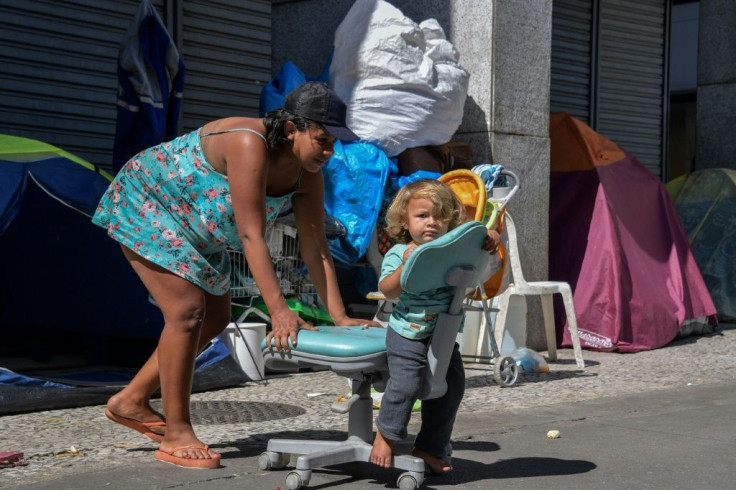Pandemic Pushes New Homeless Onto Sao Paulo Streets
When Monica's landlord suddenly doubled the rent on the room where she lived with her three daughters in Sao Paulo, she says they had little choice but to go live on the streets.
Like a growing number of poor people in Brazil's economic capital, Monica has fallen on bitter times during the Covid-19 pandemic, forcing her to choose between feeding or housing herself and her girls, ages 12, nine and two.
"If we spend everything on the rent, how are we going to fill our stomachs? People need more than just a roof over their heads, right?" said Monica, 33, who set up an impromptu camp for the family a week ago at Republic Square, in the heart of this sprawling concrete jungle of 12 million people.
She spends her days collecting and selling recyclable materials, earning around 20 to 30 reais (about $4 to $6) a day, before picking her daughters up at school, she said.
Surging unemployment and rising prices, especially for housing, during the pandemic have pushed numerous people like her into the streets.

"There's been a very big increase in the number of people living on the streets for the first time," said Kelseny Medeiros Pinho, of the University of Sao Paulo's human-rights clinic.
"If you lose your job and you don't have any alternative, the street is your only answer."
It hasn't helped, she said, that President Jair Bolsonaro's government cut emergency Covid-19 assistance to the poor from 600 reais to 150 reais (around $28) this year.
The far-right president and Sao Paulo's governor both vetoed legislation that would have put a moratorium on evictions during the health crisis.
Across Brazil, at least 14,300 families were evicted from March 2020 to June 2021, and another 85,000 are threatened with eviction, according to the organization Zero Evictions (Despejo Zero).

In Sao Paulo state alone, nearly 4,000 have been evicted, with 34,000 more threatened with eviction, it found.
Anderson Lopes Miranda of the National Homeless Movement (MNPR) called the situation in Sao Paulo unprecedented in his 30 years of involvement with the homeless.
"We used to see mainly elderly people or workers who lost their jobs ending up on the street. Now, you see families, women with children," he said.

The last official census put Sao Paulo's homeless population at 24,344 in 2019, 85 percent of them men.
Organizations that work with the homeless say that is an underestimate.
Monica and her daughters share a mattress they are borrowing from a "neighbor" on the square.
He watches over their few belongings while Monica works and the girls attend school.
"I'm trying to live a normal life. Bathe, take the girls to school. But when you wake up, you don't look very good, you know? And everyone's looking at you," she said.
"My biggest fear is getting sick and not being able to take care of my daughters," she added.
"I dream of getting off the street. I'm not giving up. I'm just working and trying to get through this."
She says she does not want to go to a homeless shelter, because she is afraid of drugs and violence there.
A few blocks away, Marcio Machado of the Power of God World Church, a Brazilian Evangelical mega-church, oversees the handout of 800 free breakfasts for the poor -- double what the church was distributing before the pandemic.
"It's a terrible situation," he said.
"A shocking number every day. Men, women, children, entire families living on the street."
The city has opened 2,393 new shelter beds to deal with the increase, and raised the number of free meals distributed daily from 7,500 to 10,000.
Daniela Rosa Neves, 24, who is seven months pregnant with her second child, watched as her almost-two-year-old son played with a scrap of banana on the street.
They have been homeless for three months.
"I worry about my kids," she said.
© Copyright AFP 2024. All rights reserved.





















